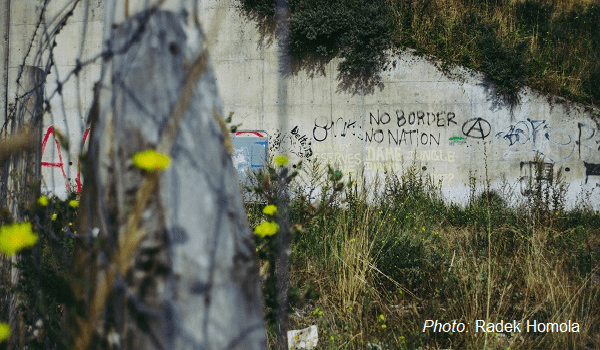An extreme right candidate in France’s upcoming presidential race has been fined 10,000 euro over hateful remarks towards young unaccompanied child migrants. New statistics on 2021 asylum requests show a general drop since 2019, with Afghans constituting the majority group of people seeking protection. A man has died while trying to mount a lorry near Calais, and another life was lost when a dinghy capsized in the Channel. A new Human Rights Watch (HRW) report highlights inhumane living conditions, police abuse, and racist violence suffered by people on the move.
Eric Zemmour, a far-right candidate in the 2022 French presidential elections, has been fined for inciting racial hatred. A French court convicted Zemmour over remarks made in 2022 in which he called young unaccompanied teens killers, thieves and rapists. The candidate has accumulated legal proceedings for similar statements and was convicted of inciting racial hatred in 2011 and inciting religious hatred in 2019. The “Great Replacement” conspiracy, according to which a ‘white French nation’ is under attack from an organised invasion of Muslims and black people, is a central plank of Zemmour’s campaigning. The far-right pundit denounced this third conviction as politically motivated and “stupid”, but has notably fallen to fourth place in the polls at 13 per cent. The human rights group la Ligue des droits de l’Homme (LDH) welcomed the ruling, noting that: “it is an important decision because behind this media theatre, there is a political project, a project of hatred which tends to stigmatize people because of their origin […] Unaccompanied minors who come to seek protection in France […] are not and will never be useful scapegoats for any presidential ambition”.
Another French presidential hopeful, Valerie Pécresse, last week slammed EU borders as “sieve-like” and backed calls for barbed-wire fences. Pécresse, the candidate for the mainstream right, visited Samos on 15 January where she described the new closed controlled centre as a “model” for the rest of the continent. The centre has been fiercely criticised by NGOs, who have called it a “prison” due to restrictions on movement. While Pécresse visited, a dozen Somali demonstrators held signs saying “refugee freedom” and described the centre as “a detention camp just like Guantanamo”. With immigration showing up as a top concern for French voters, the right-wing candidate said she is committed to both “firmness, the courage to say no […] and at the same time humane reception conditions”. Pécresse supports calls on the EU to fund border fencing, saying: “a wall is not the solution, but it can be the answer”.
Since 2018, Afghans have been the primary nationality seek asylum in France, with 12,500 first-time requests made last year. Provisory statistics show that the asylum situation in 2021 continued to be marked by the pandemic, with only 103,000 claims made (including both first claims and reapplications). This number is down from 132,826 requests in 2019, but up 7 per cent from the first pandemic year of 2020. The protection rate in 2021 was roughly 26 per cent, according to the Office français de protection des réfugiés et apatrides (l’Ofpra). France conducted 5,000 voluntary returns last year, down from more than 8,000 annually pre-pandemic. The voluntary return scheme offers people at least 1,850 euro if they return to their country of origin: larger packages include 3,500-10,000 euro of “reintegration” support for a “concrete professional project”. In total, 16,819 foreigners in an irregular situation left the French territory in 2021 (including forced, voluntary, and spontaneous returns).
Some 30 people were rescued by French police when their dinghy capsized as they tried to reach the UK on 14 January. One Sudanese man lost his life in the sub-zero water temperatures. Media reported that the 32 survivors, who were handed over to French authorities, suffered from hypothermia. More than 450 people successfully made the crossing in the first 13 days of 2022. The following day, another tragedy took place when a young Sudanese man died trying to mount a lorry near Calais. People on the move attempting to cross the UK-French border continue to face repeated evictions of their living sites in Northern France. On 13 January, 150 people were removed from a camp in Grand-Synthe: 149 tents and tarps and 88 blankets were destroyed in this incident alone, with others put in dumpsters and removed to a depot.
Human Rights Watch (HRW) have published a scathing report on the human rights situation in 2021 in France. The report highlights the inhumane living conditions and police abuse faced by people on the move. These people face racist violence and are disproportionately targeted by discriminatory police identity checks. Furthermore, HRW reports that authorities routinely fell short of their duty of care towards unaccompanied children, who were frequently abandoned without appropriate support or services.
For further information:
- ECRE, Channel: Crossings Soar in 2021 with no Legal Routes, Fears for Displaced after Calais Funding Cut, UK “Warm Welcome” Illusive as Resettlement Flops, January 2022
- ECRE, Channel: Frontex Plane Deployed, Dehumanisation Decried, NGOs Hope for Turning Point on Safe Passage, UK Ploughs Ahead with Pushback Plan Despite Challenges, December 2022
Photo by Radek Homola on Unsplash.
This article appeared in the ECRE Weekly Bulletin. You can subscribe to the Weekly Bulletin here.

